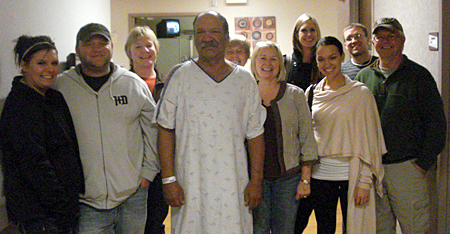Kenmare ND - Features
Real People. Real Jobs. Real Adventures.
Thanks for reading some of the latest features about area people and events.
To view every page and read every word of The Kenmare News each week,
subscribe to our ONLINE EDITION!
Kidney transplant changes life for Bob Mahlum in ways large and small
When the opportunity came for Bob Mahlum to receive a kidney transplant, he actually had two options.
1/12/11 (Wed)
When the opportunity came for Bob Mahlum to receive a kidney transplant, he actually had two options.
Bob had endured IgA nephropathy since 1984, a kidney disease that forced him to change his diet, and then his job and his address when he started dialysis three times a week at
He gave up active farming at his home outside Kenmare, started work for Farmers Union Oil in
He and Angie started hoping, applying and testing for a kidney transplant, but the demand for kidneys far exceeds the supply, whether from living or cadaver donors. Bob has Type O blood and his best chance of a successful transplant would come from another Type O donor.
A relatively new procedure would allow Angie, with blood type A2, to donate a kidney to her husband. The couple had been working with doctors at MedCenter One in
She finally received approval to donate a kidney to Bob last fall, and surgery dates were discussed and rescheduled for various reasons.
Then Bob witnessed a car accident on U.S. Highway 2 enroute to
Road conditions were icy and visibility was poor in a storm, when a young woman hit a deer and lost control of her vehicle ahead of Bob. He watched the car slide into the ditch and stopped to help, even as dozens of other vehicles passed.
The young woman, returning home to Tioga from
He shrugged off the statement, thinking of his own daughter who was about the same age as the accident victim, and continued on his way home.
Two days later, on November 12th, about a month before Angie was scheduled to donate one of her kidneys, Bob received a phone call that a cadaver kidney from a donor with Type O blood had become available.
“I was really shocked when they called,” Bob said. “I just sat there in awe.”
The kidney, from a 42-year-old male, was actually held at the United Network for Organ Sharing (UNOS) facility in
After all the preparations for her own donation, Angie admitted to having mixed feelings about the cadaver kidney. “But it was a better match,” she said. “They said there are six factors they try to match for the patient in a kidney transplant, and in this case three of them did. The doctors say it doesn’t get much better from that, even from a living relative, and I was still Plan B.”
At 3 am on November 13th, the Mahlums were informed the transplant could take place. They arrived in
The kidney came later, after a storm delay in
Bob remembered that when he was taken into the operating room, he actually saw the doctor trimming fat from the kidney. “It looked like he was chopping up lettuce,” he joked. “When they wheeled me into surgery, I was anticipating pain, but it wasn’t [as bad as] I thought it would be.”
The procedure was finished about midnight, and then the waiting began. The Mahlums had planned on five days in the hospital, but the new kidney didn’t begin functioning until the 11th day. The couple then moved to a motel, where they could continue to visit the hospital where Bob’s progress was monitored.
After his release, Bob returned to work and felt pretty good for about two weeks before complications from a strangulated hernia a month after the transplant sent him back to MedCenter One for a second surgery. Doctors worked through the same incision and muscle mass to correct the problem, but the second operation has delayed Bob’s recovery and reduced his energy level.
However, he had not returned to dialysis, and he was able to leave the state and spend Christmas with his sister’s family in
“It’s still pretty amazing they can put somebody else’s kidney in you and it’s going to work,” he said.
While on dialysis, Bob was required to take some 54 pills on a daily basis; that number has been reduced to 40, including the anti-rejection medication he will depend on the rest of his life. “Taking all those pills is kind of a pain in the neck,” he said, “and you have to be pretty fussy about it and take them at the same time every day.”
In fact, he and Angie use alarms to remind them when it’s time for the next medication round.
He has returned to work on a part-time basis. Although he is restricted on the amount of weight he can lift, he has been able to do some snow removal with his tractor at the farm.
And he is delighted to be finished with dialysis. “I can’t believe I did that three times a week for five and a half years,” he said.
While his body continues to recover and adjust to the new medication regimen, Bob has noticed a few unusual changes in some of his preferences and behaviors.
“I love popcorn,” he said. “We have a popcorn machine at work and that was one of the few snacks I could have, so I ate probably two gallons a day. Now, I can’t even stand to walk by the machine!”
He also despises the taste of spaghetti, another food he formerly enjoyed, and he’s taken to sleeping on his left side for the first time.
“They talk about changes like this, with organ donation,” said Angie, adding that she and Bob have researched similar incidents shared online by other organ donation recipients.
The couple appreciates the care they’ve received from their relatives and friends, especially as Bob’s recovery has taken longer than expected. “I was overwhelmed with cards and phone calls,” he said.
“The response from everybody in the community has been totally overwhelming,” Angie agreed as she referred to emails and cell phone messages from neighbors and friends in Kenmare and around the state.
Despite the setbacks and uncertainties of his own transplant success at this point, Bob deeply appreciates the gift of a kidney from the anonymous donor and that individual’s family. “And I would encourage other people to be donors,” he said.
“Life will be better,” Angie said. “The hard part is, while we were hoping and praying for a kidney, we knew we would benefit but somebody else would go through a tragic loss.”
The Mahlums support organ donation, with individuals and families communicating about those decisions before an emergency or tragedy. Further information about organ donation can be found at the National Kidney Foundation website www.kidney.org or at the federal government’s website for organ and tissue donation at www.OrganDonor.gov.


